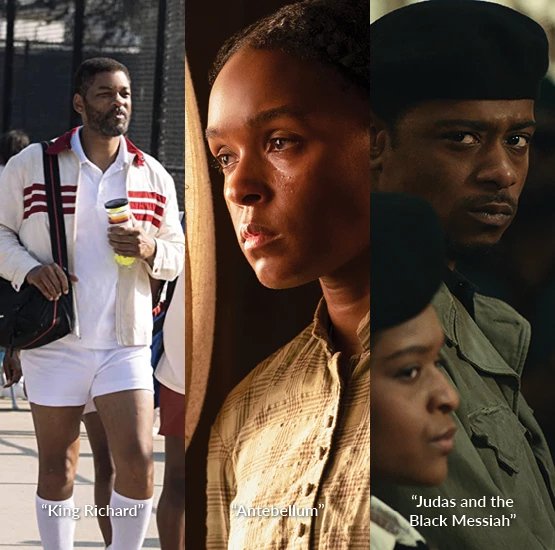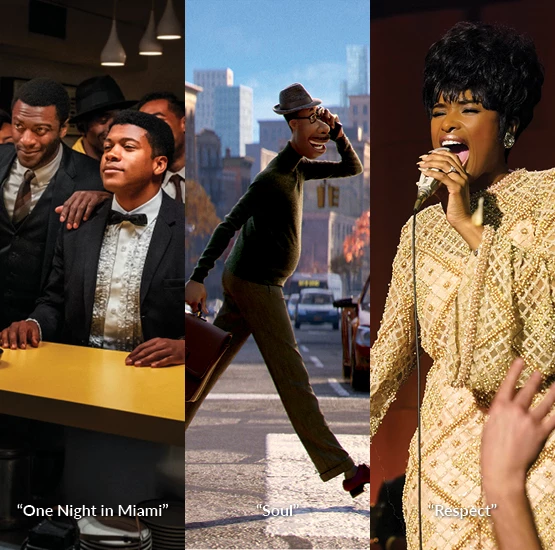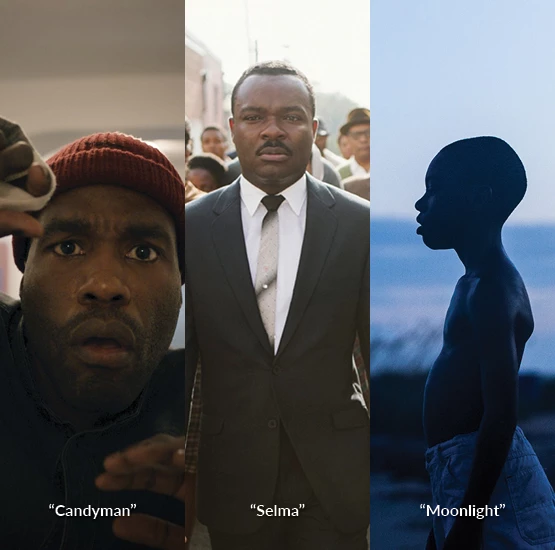12 Movies for Celebrating Black History Month
This February, pay tribute to the remarkable achievements in black history and reflect on relevant issues in our country with new release and past favorites films. The 12 movies featured below are inspirational, reflective, impactful and important. Use them to raise awareness, highlight diversity and inclusion, and spark powerful discussions with your audiences throughout Black History Month.

King Richard – Modern cinema often lacks proper representation of black fathers – showcasing them as absent or problematic instead of a positive, active influence in their lives. That’s not the case with “King Richard.” The tennis biopic spotlights Richard Williams’, father of Serena and Venus Williams, unyielding devotion to helping his daughters excel in a predominantly white sport.
Antebellum – Janelle Monae stars as Veronica, a successful author, mother and spouse who finds her world turned upside down when she is abducted and enslaved on a plantation run by what appears to be Confederate soldiers. Veronica must find the strength to stay alive and the courage to help others who have been enslaved find a way out of this mind-numbing living nightmare. “Antebellum” is one-part thriller, one-part social commentary on how racism impacts our culture and continues to divide us.
Judas and the Black Messiah – This Shaka King film tells the story of Black Panther Party leader Fred Hampton and William O’Neal, the party member who gave info to the FBI that led to Hampton’s eventual death at the hands of the Chicago police during a raid in 1969. Not only is the film a captivating watch, it’s also serves as a great catalyst for discussion around political and social justice issues of today. “You could call these movies timely, except that the issues they confront, from the exploitation of Black American culture to white supremacy in law enforcement, have never not been timely,” wrote NPR. “As Hampton notes in a speech that seems to describe this fractious nation at any given moment: ‘America's on fire right now, and until that fire is extinguished, don't nothing else mean a damn thing.’”
One Night in Miami – Portrays a fictionalized meeting in 1964 between four iconic American figures: Malcolm X, Muhammad Ali, Jim Brown, and Sam Cooke. The men convene in Miami to celebrate Ali's victory over fellow boxer Sonny Liston. Directed by Regina King, One Night In Miami reimagines the events of February 25, 1964 when Muhammad Ali, still called Cassius Clay then, NFL star Jim Brown, musician Sam Cooke, and Malcolm X spent a night together in a Miami—the same night Clay became the heavyweight champ. In the film, the foursome discuss being Black in America, religion, and their own legacies.
Soul – This animated film made history as the first Pixar film with a black lead. Jamie Foxx voices the lead character of a Queens music teacher with dreams of becoming a famous jazz musician who learns what’s important about living when he explores the afterlife.
Respect – “Respect” is a biographical musical drama highlighting 20 years in the life of Aretha Franklin. Starring Academy Award winner Jennifer Hudson, the Queen of Soul was so much more than simply a music icon. This bio spotlights her influence over black history – and history in general – including her significant civil rights activism.


Candyman – Directed and co-written by Nia DaCosta, alongside co-writer and producer Jordan Peele (director of “Get Out” and “Us”), “Candyman” made history as the first film directed by a black woman to debut at no. 1 at the box office. The film is a continuation of the classic 1992 horror about a Black serial killer with a hook for a hand who can be called back to life if you look into a mirror and say Candyman five times. This update places the urban legend in Chicago where a visual artist named Anthony McCoy recently moved into a luxury loft in Cabrini, gentrified by upper millennials like his girlfriend. Finding himself blocked creatively as a Black artist in a mostly white space, McCoy becomes inspired by the grisly stories of the “Say My Name” killer who used to haunt his neighborhood. The film offers up relevant social commentary on a variety of issues, including racial injustice, police brutality and community displacement.
Selma – Honoring Dr. Martin Luther King Jr.’s legacy and message of peaceful protests, “Selma” is the true story of the bold civil rights march King lead from Selma to Montgomery to address voting rights in 1965. The movie itself made history when its director, Ava DuVernay, became the first black female director to have her film nominated for the “Best Picture” Oscar.
Moonlight – The 2017 “Best Picture” Oscar winner, “Moonlight” demonstrates the universal plight of self-identity through Chiron – an African-American man who struggles with his sexuality from childhood to adulthood. Covering Chiron’s childhood, adolescence, and adulthood, this film provides a visual example for discussing masculinity and sexuality in the black community.
Fences – Based on the Pulitzer Prize-winning play, “Fences” is a compelling story of one man’s attempt to come to terms with the meaning of his life. Set in Pittsburgh in the 1950s, Troy Maxson, played by Denzel Washington, is a former baseball player denied, due to his race and the times, the opportunity to play in the major leagues. Troy instead works on a garbage truck with his good friend Jim Bono and attempts to support his wife, Rose (Viola Davis), his children and his disabled brother. All the while Troy fights his own inner demons and struggles to balance his family obligations with the dream he was denied.
Black Panther – The very first mainstream black superhero film, “Black Panther” became a cultural phenomenon when it premiered – opening up the dialogue and personal reflections about black identity in America. Featuring nearly an all-black cast, helmed by a black director, set to a black soundtrack and using an African storyline, the film’s success and thought-provoking discussion on black empowerment demonstrates the importance of diverse representation in Hollywood.
A Raisin in the Sun – Based on the Tony-winning play by Lorraine Hansberry, “A Raisin in the Sun” spotlights an African American family ambitions to move beyond segregation and disenfranchisement in 1950s Chicago. The original Broadway production marked the first for a Black woman, and also starred the recently deceased Sidney Poitier (along with the film adaptation). The play was nominated for four Tony awards and was named “Best Play” by the New York Drama Critics Circle, the first time an African American was awarded the prize.

Available Discussion Guides - We have discussion guides available for many of these films, as well as more titles not listed, to help drive discussion around diversity and inclusion on campus. Fill out the form to receive more information about our free discussion guides, as well as tips for creating a strong Black History Month movie lineup!
All of these films are available for your Black History Month programming! View our entire collection of Black History Month films or contact us to learn more!